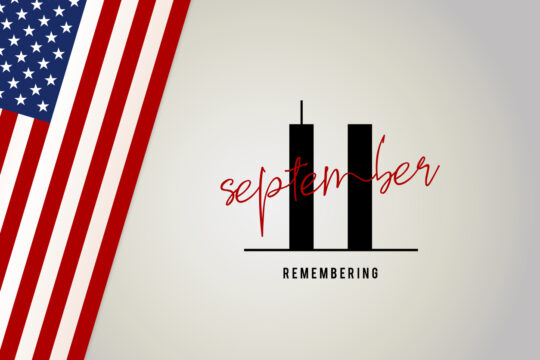
Today—September 11, 2023, 22 years after one of the most defining events of 21st Century Americans’ lives—finds many of us reflecting on the events that changed the course of history. In fact, a Pew Research analysis two years ago noted that more than 90% of Americans over the age of 30 can vividly recall the emotional recoil that hit them as they watched the terrorist attacks unfold, both in the moment and in the weeks and months that followed. Adolescents then may not today recall the trauma as distinctly, but many likely still recall the despair that settled on their families.
War was here, on our very soil. The immediate loss of life was staggering, certainly, and without reserve we all mourned for the victims and their families. We mourned as a nation and turned inward in search of understanding. What was happening? Why was it happening? What will happen next?
While we witnessed the carnage unfolding in real time, we also witnessed an outpouring of patriotism as the implications became clearer. We were not as invulnerable as we thought. Out of the outrage that followed, we witnessed a resurrection in non-partisan resolve and a renewed sense of duty to serve, with many Americans seeing the attacks as a call-to-action.
In the heat of the moment, the Nation watched as President George Bush, climbing a mountain of rubble with bullhorn in hand, rose to the occasion and set a tone that captured the emotions of a stunned and suffering country.
A recent article by FOX News digital reporter Peter Aitken gives credence to the 9/11 call-to-action by citing the impact on military enlistments with the comment, “9/11 had the biggest effect on military recruiting since Pearl Harbor.” From 2002 through 2010, the military saw substantial yearly increases in enlistments, no doubt fueled by patriotic resolve.
But there’s another driver in this equation, and it’s a factor that I believe most Americans felt in the wake of the momentary unsteadiness we all experienced. I look at as simple accountability and hasten to point out that this is not a conflation of the terms “accountability” and “responsibility.”
Accountability in this sense refers to personal accountability in the face of a disastrous situation…accountability meaning accepting that the situation occurred and cannot be undone, and resolving to not allow the horror of the terrorist attacks to preclude our recovery. Our country was victimized, but we chose to not wallow in defeatist thinking. Our military stepped up and immediately went on the offensive, while our society embraced the families of the Americans lost in the violence.
To be accountable is to not be a victim, even when victimized. Following 9/11, Americans driven by patriotism chose to avoid the handwringing and instead look forward to recovery. Some chose the military, others chose to lean on each other to recapture a spirit that was momentarily—but not permanently—shattered.
Twenty-two years later, we’re still working to fully recover the spirit of community that helped us survive the aftermath of 9/11’s devastation. There are new challenges every day…new conflicts, new choices, new quarrels…all of which call for us to adhere to a sense of accountability in which we look beyond victim-type thinking and instead apply ourselves to the pursuit of positive outcomes. 9/11 taught us how to accomplish that.
I remember it even more vividly than I remember Kennedy’s assassination because my personal family was affected, but i recall
the sense of patriotism which prevailed. For me, it fostered a resolve that Americans are and always will be strong enough to withstand such misfortune. I especially long for the sense of love for our country, the patriotism which permeated everywhere I turned, American flags flying from homes, cars, in front yards, and in the streets – something that seems frightfully lacking today, especially with today’s younger generation. Nevertheless, I know this is the greatest country in the history of the world, and feel blessed to be a citizen of it. For older Americans, it is now in the hands of our children, grandchildren, and great-grandchildren to carry our flag high and love our country as we do, so it can continue to be a beacon of light for the entire world, even in these current stressful times. Today would be a good day to listen to the song “I’m Proud to Be An American.” as well as the National Anthem, and reflect upon exactly why some many want to live in our country.